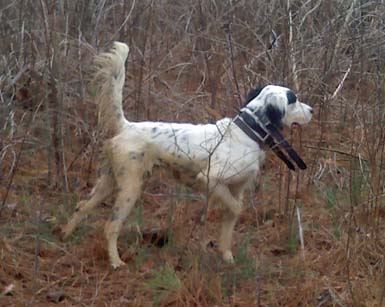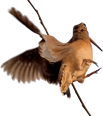Tracking a grouse dog with bells, beepers and satellites
 When I began hunting with grouse dogs in the mid 1970s, the only way to keep track of my dog was by hanging a bell on its collar. I could follow the dog’s movements and actions and, when the dog stopped, so did the bell. But it could be difficult and time consuming to find it on point if the cover was dense (as is most good grouse cover) or my dog was far away (which it was occasionally!).
When I began hunting with grouse dogs in the mid 1970s, the only way to keep track of my dog was by hanging a bell on its collar. I could follow the dog’s movements and actions and, when the dog stopped, so did the bell. But it could be difficult and time consuming to find it on point if the cover was dense (as is most good grouse cover) or my dog was far away (which it was occasionally!).
The next evolution came in the early 1980s when the first electronic beepers were produced. Now I could keep track of my dog while it was hunting and locate it on point. These beepers generally emitted a high-pitched sound in a certain cadence when the dog was moving and another sound and/or cadence when the dog stopped. I couldn’t determine what my dog was doing as well as with a bell but the capability to find it on point was revolutionary.
Since those early beepers, manufacturers have produced numerous units of various sizes, sounds and functions. Beepers have also been combined with ecollars and these units are quite sophisticated. From the ecollar transmitter, the beeper can be turned on and off and the tone or volume can be adjusted.
Then in 2007, another innovation was introduced by Garmin, a leading navigation and communication company. They launched a GPS-enabled dog tracking system called the Astro 220. I now know exactly my dog’s whereabouts, if it is running or on point and the distance and directions to it.




